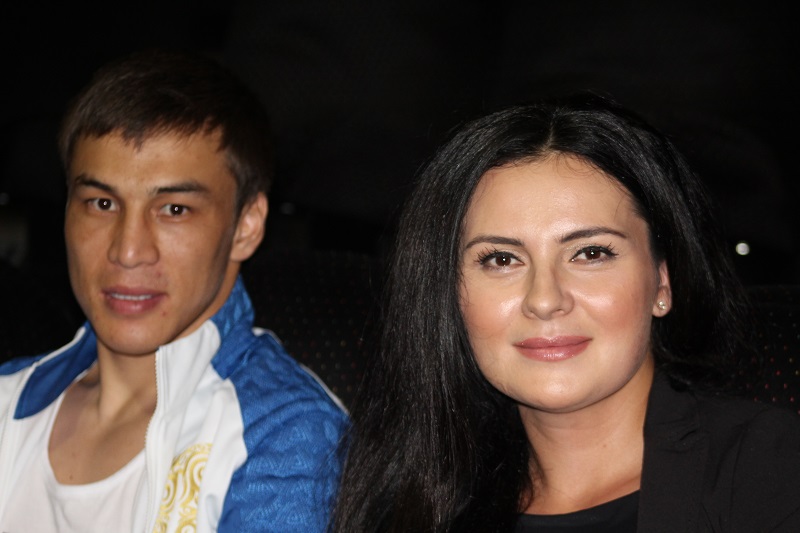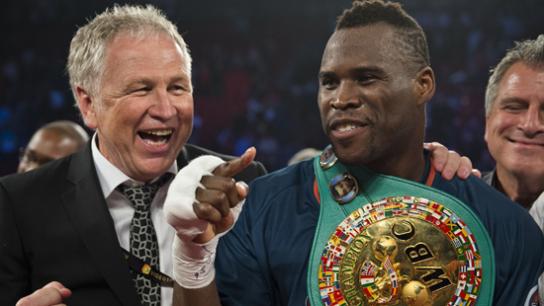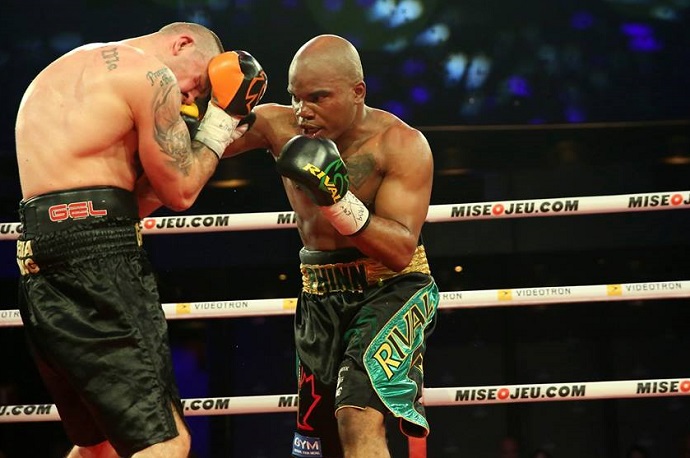Anna Reva: “I’ll Never Quit”
“I never thought that something like this would happen between me and Artur,” Montreal boxing manager Anna Reva says over the phone. She is speaking, of course, about the defection of her former charge, Artur Beterbiev, who left Reva to join Al Haymon’s team this past spring. That situation is still winding its way through the courts, and however burdensome it’s been, professionally and personally, Reva never considered leaving boxing. Giving up is incompatible with her strong personality. “You have to kill me to stop me,” she states. “I’ll never quit.”
True to her word, Reva has returned with another promising fighter. Batyr Jukenbayev is a left handed super lightweight from Kazahkstan with an extensive amateur record and heavy hands. This Saturday he will have his first professional fight against Mexico’s Noel Mejia Rincon; it is a four round bout and will occur on a charity card hosted by Ghyslain Maduma at the Bain Mathieu in Montreal. Jukenbayev is a puncher with fine technical skills who grew up admiring Mike Tyson, and has the sort of versatile repertoire that inspires Reva’s faith. She says he possesses every tool necessary to succeed.

“He has punching power, he’s physically strong, very technical,” says Reva. “He’s a very exciting boxer. People can expect a lot of knockouts from him.” Reva adds that she sometimes cancels work meetings to go and watch him spar, so captivated is she by his style. But despite his talent, Reva won’t move Batyr too quickly. Jukenbayev has only been in Canada for a few months, and will need time to find his place in a country where his language is spoken only amongst fellow immigrants. The process of adjustment that international fighters face is something Reva is highly attuned to, having been through it with Beterbiev. Like Beterbiev, Jukenbayev was acquired by way of Reva’s well-placed boxing contacts in Central Asia.
While Jukenbayev must acclimatize himself to life in Montreal, Reva believes his strong character will expedite this process. “He has a very good personality. He’s a good young man and he wants to be the next star. He’s very respectful, disciplined, determined. He has all the qualities to become the next champion.” Reva’s words underscore the importance of aligning herself with people of substance. Having been spurned by the first fighter she ever managed—into whom she’d invested so much time and effort—she is resolute that history won’t repeat itself.
This is largely why so much consideration is going into Juyenbaev’s development. Part of that is providing him with a team capable of attending to his every need. He is working with Stéphan Larouche, a well-known trainer and boxing personality in Quebec, and has a nutritionist, strength coach, and massage therapist on his team. They are closely monitoring how Batyr responds to both his new environment as well as the process of transitioning from amateur to pro.
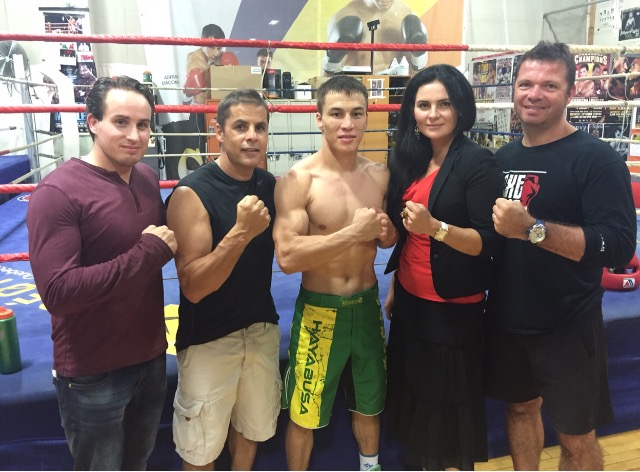
Only by providing him with this degree of support can she build a relationship that will last. “Trust is everything in this business,” she says.“I do things beyond my fiduciary duties. We’re creating that bond with him because we want him to succeed. We want to show him that we’re not just focused on boxing, but on anything he needs.”
Jukenbayev is only the latest Central Asian fighter that’s come to North America to pursue a professional career. The most popular of these is Gennady Golovkin, the Kazahk slaughterer who will fight Montreal’s David Lemieux on October 17th and who Reva describes as a “national hero” in Kazahkstan. Jukenbayev, like Golovkin, is the product of a culture for which boxing is a natural fit. Central Asia is such a fertile place for talent, Reva says, because fighting is embedded in the genetic code of its people. “From the time of Ghengis Khan, the tribes there used to fight each other for territory,” she observes. “So we’ve adapted to this sport very well.”
While fighting might be inherent to those hailing from the Eurasian steppe, their boxing style isn’t wild and uninhibited, but refined and precise. “Clean-cut boxing,” Reva says, emphasizing its unique aesthetic. “It’s a pleasure to watch them, because it’s boxing to perfection. Very technical.” Indeed, fighters like ‘GGG’ and Sergey Kovalev, who hails from Chelyabinsk, a Russian city near the Kazahk border, have remarkably clean technique, honed over long amateur careers. Like his recent forebears, Jukenbayev has the same amateur pedigree and boasts the sharp skills and brutal punching power that have made Golovkin and Kovalev stars.
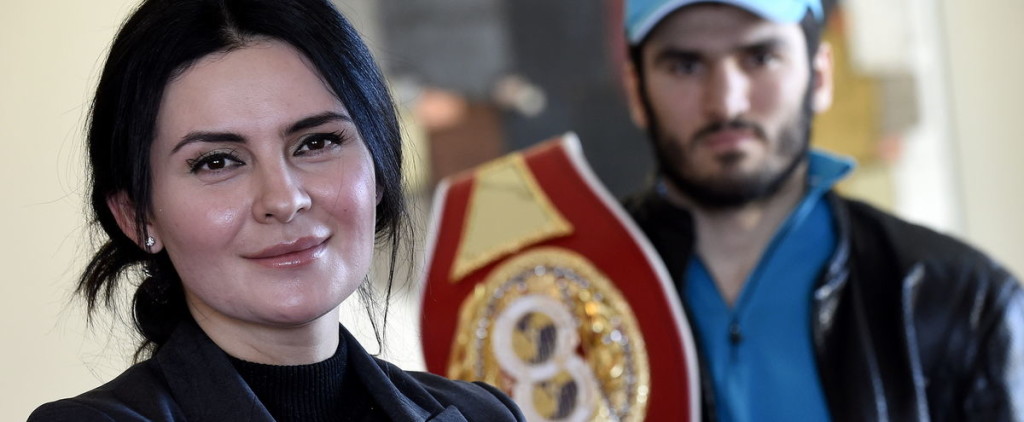
Central Asia, so exotic and enigmatic to most Westerners, is several time zones from Montreal. Why does Reva make her home here? “The city chose me,” she says, referencing Montreal’s cosmopolitanism. She was eager to learn two new languages, and speaks both with the confidence and fluidity of a native speaker. Interestingly, although Montreal has been historically plagued by corruption, Reva cites its transparent business practices as one of the reasons she loves the city. This is especially important since boxing is not Reva’s full-time focus. Her primary career is in real estate, and despite the seriousness with which she performs her managerial duties, she refers to her work in boxing as a “pleasure”.
When I ask about the role her gender plays in a business that, to an outsider, might seem opposed to female involvement, Reva replies that being a woman is no hindrance. “I’m a tough cookie” she says, “and I can handle it. It just depends on the personality that you have. If you’re a good negotiator you have nothing to worry about.”
Reva’s manner is one of calm self-assurance. There is no Don King-like bombast or mellifluous language laced with malapropisms. Her understatement and ostensible genuineness—so rare in boxing—is an elegant reprieve from the cynicism and hyperbole which marks the speech of so many members of boxing’s establishment.
In a sport for which promoters and managers are often cast, however reductively, as devious characters indifferent to the welfare of their fighters, Reva forcibly resists archetypes. During our conversation she continually champions integrity as a principle value. And, given the fragility of fighters and the utter ruthlessness of professional boxing, maybe there is a fundamental advantage to managing with a maternal instinct. “You have mother tasks all the time,” she says. “They’re like small children who require a lot of care.” This is not condescending speech, but reinforcement of the obligation managers have to young men who, as in Jukenbayev’s case, require the most basic support to fulfill their potential.
Reva says she’s only interested in managing champions, fighters who box in a way that both entertains and inspires. For her, the sport is as much an ideal as it is an athletic contest. “Boxing helps people conquer obstacles in life, because life is boxing: you have to work hard to succeed. Boxing is the same.”
— Eliott McCormick

